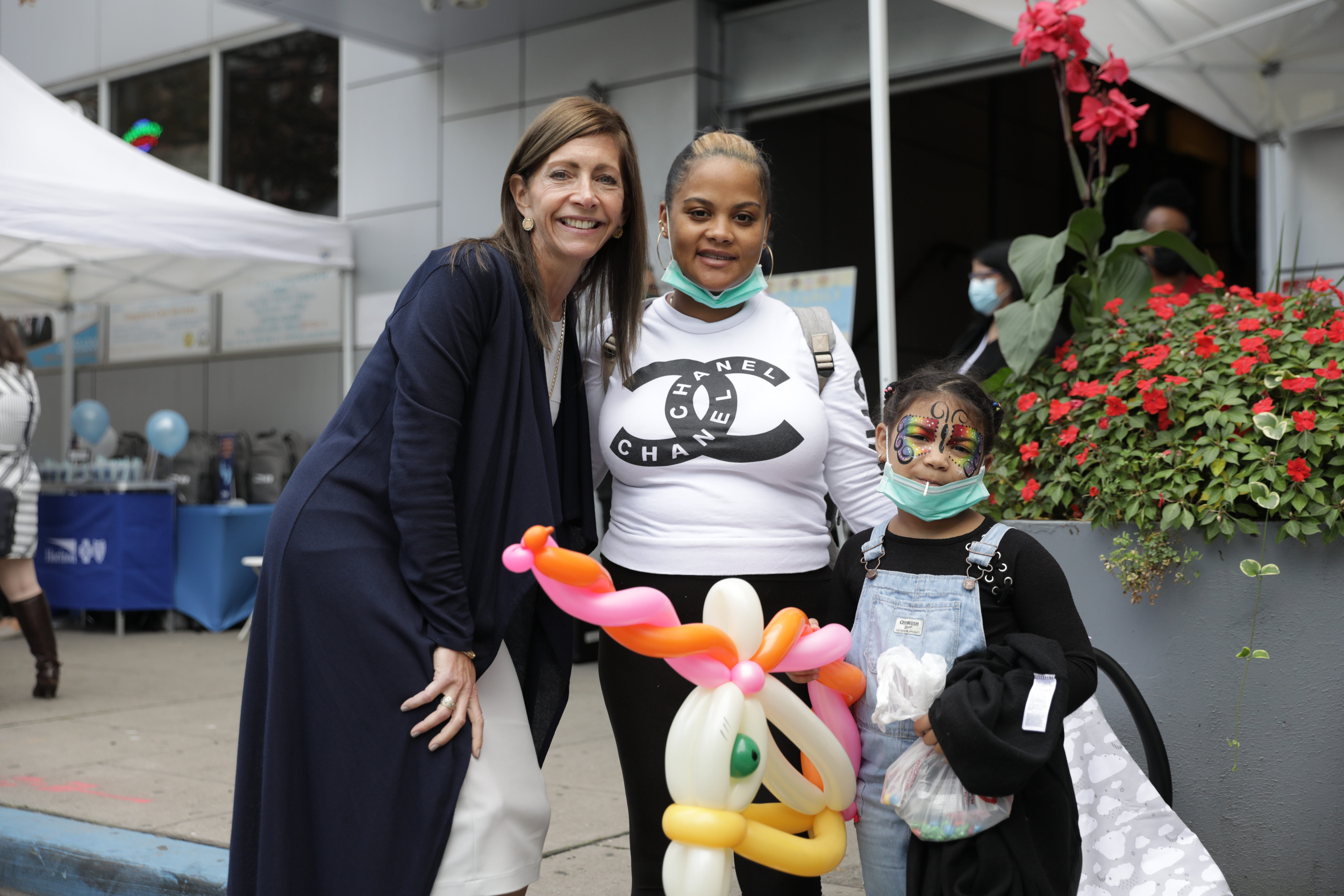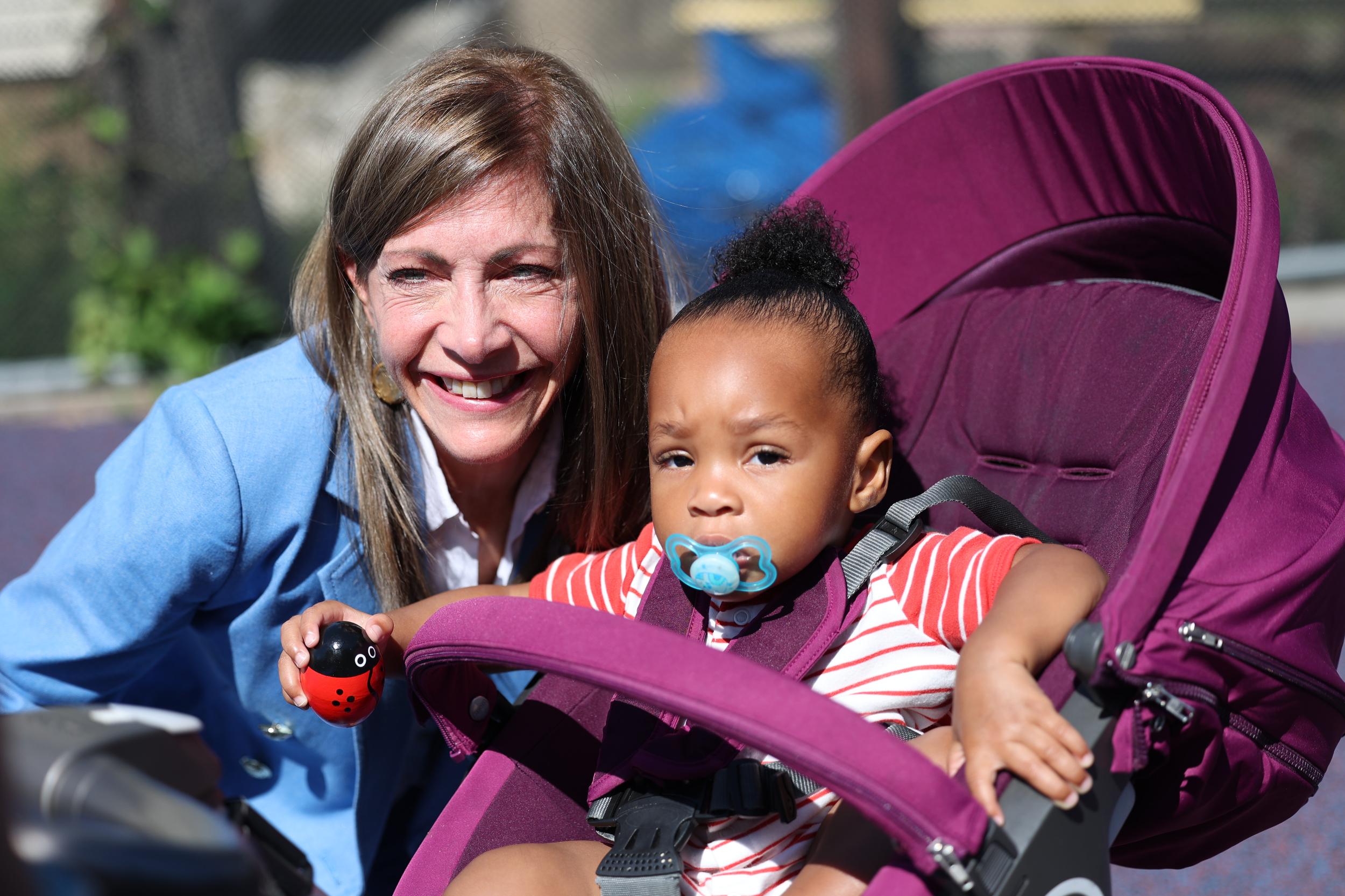“New Jersey is on the road to becoming the safest and most equitable place in the nation to deliver and raise a baby, and I hope one day our country will have that same label in the world.” – New Jersey First Lady Tammy Murphy
Interview with New Jersey First Lady Tammy Murphy
In 2022, the Burke Foundation honored New Jersey First Lady Tammy Murphy as a Community Champion. We were fortunate to connect with her to discuss her multisector efforts to improve child and family wellbeing in New Jersey. In 2019, the First Lady launched Nurture NJ — an initiative that aims to reduce racial disparities in maternal and child health. Through the initiative, the First Lady has ushered in groundbreaking achievements, including building a Maternal and Infant Health Innovation Center in Trenton, implementation of universal newborn home visiting, and expansion of postpartum Medicaid coverage. Since her appointment as chair of the National Governors’ Association’s (NGA) Governors’ Spouses’ Program, Tammy Murphy is expanding the work of Nurture NJ across the nation through her NGA Initiative on maternal and infant health. Read on for insights on the First Lady’s efforts.

We often discuss maternal and child health from a scarcity mindset. How do you work to raise awareness of poor maternal and infant health, while celebrating the joys and victories of maternal health stakeholders in the state?
While the crisis our state and country face with horrific infant and maternal health inequities is unspeakable, we are fortunate to have extraordinarily committed partners — including, of course, the Burke Foundation — who stand alongside our mothers and families in tackling this scourge.
We have an ambitious goal — to become the safest, most equitable place in the nation to deliver and raise a baby. Thankfully, we’ve made incredible progress these past few years. Not only are we starting to see these gains in our own data, but the 2022 March of Dimes Report Card also highlighted New Jersey as one of only 4 states to actually improve birth outcomes. Celebrating the wins — whether it’s including nearly $60 million in our budget for maternal and infant health initiatives or creating the nation’s most robust universal nurse home visitation program — helps us build the necessary momentum to reach that goal.

What pushed you to address maternal mortality? Why was it important to involve a range of stakeholders? How do you want to see Nurture NJ continue to grow in the coming years?
When Phil entered office in 2018, the United Health Foundation released a report that ranked New Jersey 45th in the nation for maternal deaths. Unfortunately, due to the lagging nature of the data, we subsequently dropped to 47th place, and we found that we also have among the widest racial disparities for maternal and infant deaths in the nation. Phil saw this issue as a priority and asked me to look into our state’s mortality rates. The more I learned about the crisis, the more it became apparent that any long-term solution would need to be multi-pronged, holistic, and innovative. In 2019, I launched Nurture NJ to reduce our state’s maternal mortality rates by 50% over 5 years and eliminate racial disparities in birth outcomes. Two years later, we launched the Nurture NJ Maternal and Infant Health Strategic Plan, our roadmap to achieving those goals through more than 70 actionable steps. To date, we’ve made progress on over half the recommendations in the plan.
My hope is that Nurture NJ continues to make an impact in New Jersey enabling us to move the needle, not just today, but also well beyond Phil’s administration.
During your time as First Lady, you’ve met with moms, families, and community members to inform your work. What story still stands out to you today?
We have been graced over the last 5 years by far too many souls who have shared their gut-wrenching stories in an effort to raise awareness and help others have better outcomes: moms who have lost babies, fathers who have lost life partners, families and friends who have watched loved ones suffer needlessly. The stories and trauma are widespread, but in our effort to center women’s voices in maternal and infant health, I would like to highlight Ajanee McConnell, one of our New Jersey moms and an incredible ally to Nurture NJ, who has shared her story at several of our events.
Ajanee was a college student on her mother’s health insurance at the time she became pregnant, and she had a great doctor and care team with whom she felt very comfortable. Because her mother’s insurance didn’t handle maternal care, she transitioned to Medicaid. As a result, she had to leave the practice and doctor she loved and find another that accepted Medicaid patients. Anyone who has been on Medicaid can tell you, the choice of doctors is limited and the practices are overwhelmed with patients. At each appointment, Ajanee waited hours to be seen and was repeatedly assigned to different doctors, making it difficult for her to build a relationship and have continuity of care. When Ajanee began to experience abdominal pain and brought her concerns to her doctors, she was dismissed repeatedly. Ultimately, Ajanee went into early labor, delivered her baby boy and watched him struggle for survival until his passing three days later. I am so grateful to Ajanee for persistently sharing her powerful and tragic story to help others.
In just one mother’s story, we see not only economic inequity — given Ajanee’s challenges with Medicaid — but also social inequity as she was repeatedly dismissed by her doctors despite raising the alarm. Not being heard is a frequent refrain voiced by mothers of color regardless of socioeconomic status, as evidenced by the experiences conveyed by Serena Williams and Beyoncé. We simply cannot dismiss any of the lived experiences. Each one is unacceptable and will help us move beyond this scourge.
Your advocacy as First Lady has elevated New Jersey to the national stage with implementation of universal newborn home visiting, Medicaid reimbursement for doulas, and other policy wins. If you had to choose one, what is your proudest achievement so far?
We repeatedly say that it is transformational change that will move the needle with respect to infant and maternal mortality. To that end, I am proud of our stakeholders as well as everything we have accomplished from Phil’s signing 43 pieces of legislation in this area to our 16 Family Festivals, 5 annual summits, our Ask an Expert series, and our comprehensive Strategic Plan. Saying that, I would elevate Universal Newborn Nurse Home Visitation model as one approach that really inspires me. As we work to combat New Jersey’s Black maternal and infant health crisis through Nurture NJ, we know that those first weeks post-partum are absolutely critical in determining maternal and infant health outcomes, especially when 1 in 3 maternal deaths occur in the first year after childbirth and 90% of them are preventable. Not only is this model respectful with zero stigma, given its universal access, but the program will also ensure moms are connected to state and local resources ranging from WIC to housing, transportation, food access, and so much more. Through this program, we are making clear to all New Jersey families that their health, wellness, and development are our highest priority, beginning with birth.
As I mentioned, we are making positive strides in New Jersey, but there is still much more work to be done, both here and across the country. The March of Dimes 2022 Report Card did highlight New Jersey as one of only 4 states to improve birth outcomes, but it also stipulated that 47 other states and territories worsened and, overall, the United States was given a D- as a country. That is unacceptable. It is my hope that a continuously evolving Nurture NJ can be viewed as a national model for other states to follow and thus improve our international ranking. In my role as the NGA Spouses’ chair, I will continue to listen and do whatever I can to aid other states in their efforts to support their mothers and babies. New Jersey is on the road to becoming the safest and most equitable place in the nation to deliver and raise a baby, and I hope one day our country will have that same label in the world.
All photos used in this interview are credited to Edwin J. Torres/NJ Office of the First Lady
